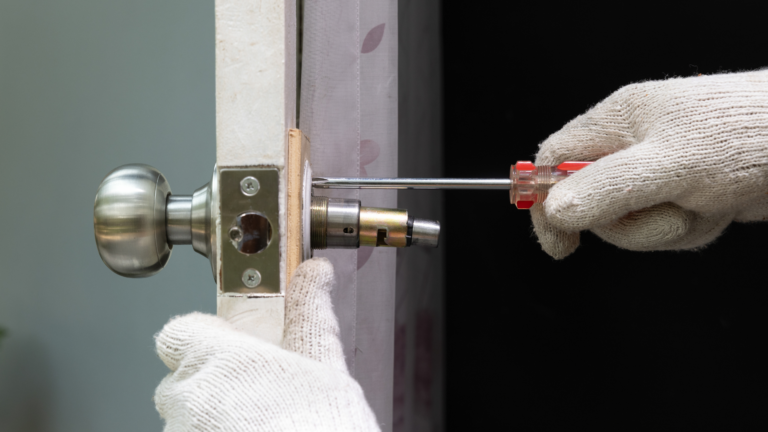Crucial for home security, locks can encounter problems that weaken their effectiveness. Promptly addressing these issues is essential for maintaining safety. Here, we delve into prevalent lock troubles, presenting detailed insights and extra solutions to keep your locks in great shape.
Sticky Locks That Are Difficult to Turn
Causes
The main reasons why locks malfunction include rust deposit, debris buildup, and worn internal components. Over time, the lock mechanism may become less effective due to the accumulation of dust, grime, and other material inside of it. Moisture exposure in older locks or those frequently outdoors can lead to rust. Additionally, frequent use can erode internal components, increasing the likelihood of lock problems.
Detailed Solutions
Thoroughly clean the internal components of the lock with a gentle brush and suitable cleaner if you are comfortable with the disassembly process, to remove built-up debris and old lubricant. Keep the surrounding area clean to keep debris out and grease the locks on a regular basis.
Locks and Striker Plates with Alignment Problems
Causes
Doors and frames may move as a result of structural settlement in older structures. Moreover, fluctuations in weather conditions can cause materials to expand and contract, potentially causing doors and frames to become misaligned.
Detailed Solutions
When realigning a door, begin by using a screwdriver to tighten the hinges and adjusting shims as needed. If the latch doesn’t align with the strike plate, remove and reinstall it in the proper location, possibly using a chisel to create additional space. Furthermore, weather stripping can be changed or improved to improve door alignment and avoid misalignment problems in the future, guaranteeing a smooth and secure fit of the door in its frame.
Key Breakages
Causes
If keys develop weak spots over time, especially with frequent use or force, their integrity may be compromised. In addition, frequent use wears down the metal and increases the chance of breaking.
Detailed Solutions
Start by carefully catching and removing the broken fragment of a key from the lock with a key extractor tool or a small jigsaw blade. Remember to check keys for wear regularly and duplicate them before they wear out. Avoid using heavily worn keys to prevent breakage. If you struggle to remove the broken key, consider contacting a locksmith for assistance; they possess specialized equipment to safely retrieve it.
Loose or Shaky Locks
Causes
In areas with a lot of foot traffic, locks frequently become loose because they are used so often, wearing down their mechanisms. If locks are not installed correctly, they may become loose over time due to insufficient initial fastening.
Detailed Solutions
Begin by removing the cover and tightening all visible screws to maintain the lock’s functionality. Ensure the lock mechanism is securely installed in the door. In addition, identifying any worn-out components may necessitate replacing the entire lock mechanism to ensure its effectiveness.
Need a locksmith? Don't Worry!
Our expert locksmiths are available 24/7. We're here to help with all your emergency lock needs. Don't hesitate, call us now!
Key Won’t Insert Fully
Causes
Debris or foreign objects have the potential to block the keyway, causing disruptions in the smooth operation of the lock. Also, a bent or damaged key may hinder full insertion, affecting the lock’s functionality. Both issues require prompt attention to maintain smooth key operation and ensure lock security.
Detailed Solutions
Clear any visible debris from the keyway using a thin, non-metallic tool to ensure your lock works properly. Then, inspect the key for bends or damage and replace it with a new one if necessary to prevent future problems. Should the issue continue, consider consulting with residential locksmiths in Cranberry Township, PA who can carefully inspect and clean the lock’s internal components to ensure optimal performance and security.
Lock is Frozen
Causes
The freezing of moisture inside a lock due to cold temperatures can affect its functionality. Without proper weatherproofing, locks in severe weather conditions can freeze, affecting their functionality. Ensuring locks are well protected from the elements is crucial to prevent moisture buildup and freezing.
Detailed Solutions
Use a lock de-icer spray containing alcohol or similar substances for rapid thawing of a frozen lock. A lock cover provides protection from inclement weather, and lubricating surfaces before the winter season aids in keeping moisture out. If the lock stays frozen, cautiously heat the key with warm water or a lighter before using it to melt the ice inside the lock.
Resolving common issues promptly and recognizing when professional assistance is needed are essential to maintaining the security and functionality of locks. Ensuring the integrity and dependability of your home’s locking systems requires regular maintenance, timely improvements, and appropriate care.
If you’re dealing with issues concerning your home’s locks and need a solution, consider consulting residential locksmiths in Cranberry Township, PA. Our proficiency and specific tools allow us to handle a variety of lock-related issues, enhancing comfort and property security. If you need assistance, don’t be afraid to get in touch with us straight away!

